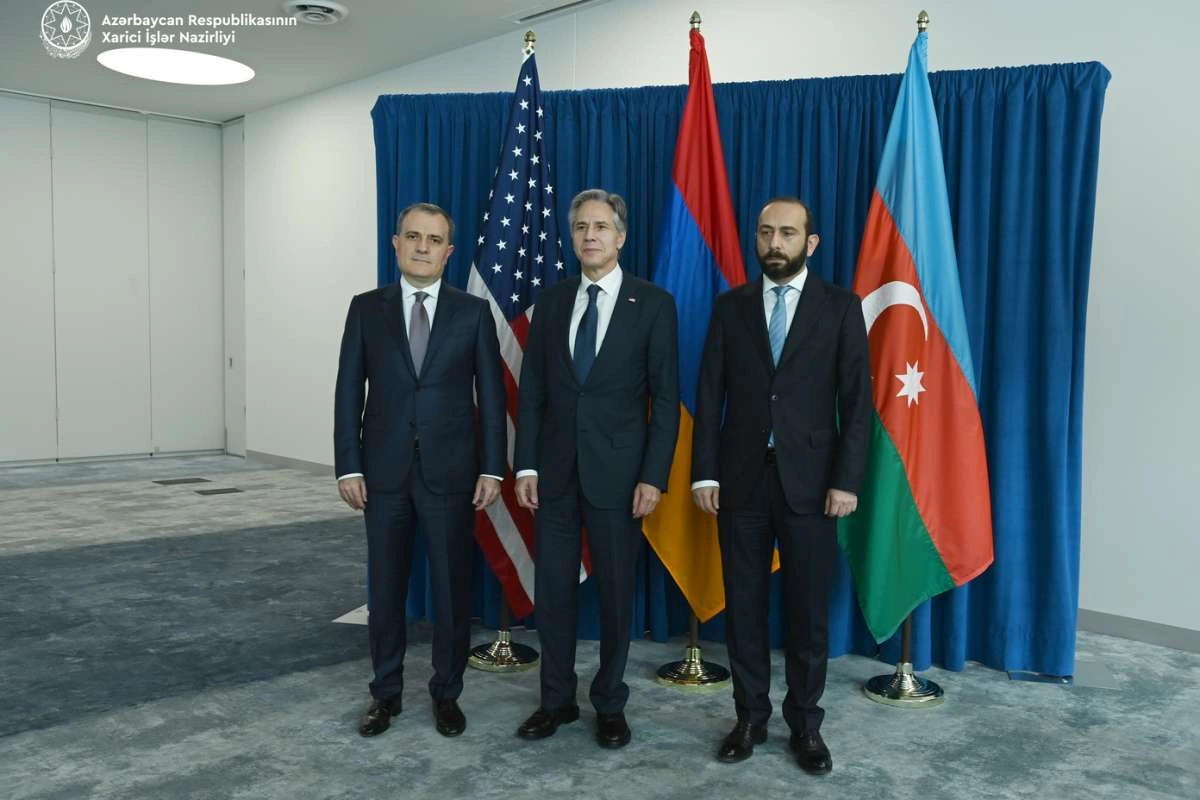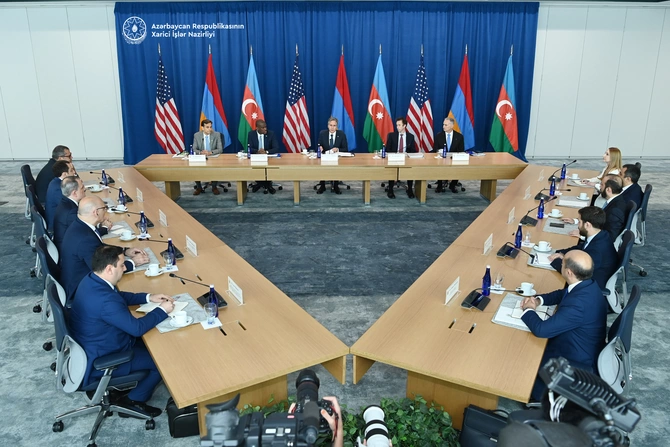
Three days of high level talks aimed at finding a peace deal between Armenia and Azerbaijan concluded as planned on Thursday despite more deaths on the ground in Karabakh at the start of the week.
Image: mfa.gov.az
June 27-29 saw the latest three-day round of talks between the Azerbaijani and Armenian foreign ministers in Arlington, Virginia, near Washington DC.
At the short opening briefing, the international press seemed more interested to ask US State Department spokesman Matthew Miller questions about Yemen and the whereabouts of Yevgeniy Prigozhin than about the Caucasus – such is the general sense amongst much of the world media that the peace process is getting into something of a home straight.
It’s been over a month since Armenian Prime Minister Nikol Pashinyan indicated that he would recognise Azerbaijani sovereignty over Karabakh as part of a peace deal. And photos tweeted yesterday by US Secretary of State Antony Blinken showed what appeared to be a very relaxed mood between himself (Blinken), Azerbaijan’s Jeyhun Bayramov and Armenia’s Ararat Mirzoyan.
In the end, however, progress proved less substantive than might have been hoped. At the conclusion of the talks, Blinken gave the upbeat message that there had been “agreement on some additional articles as well as deepening understanding of the positions on other outstanding issues” while accepting that there “remains hard work to be done to try to reach a final agreement."
One of the sticking points remains a confidence building mechanism for the Karabakh Armenians and the process by which they can be integrated into Azerbaijani state structures without feeling threatened. Armenia wants specific security guarantees for these people while Azerbaijan insists that such measures are unnecessary and would amount to interference in its internal affairs.
Quoted a week before the talks, Mr Bayramov insisted that the “constitution and a number of international conventions to which Azerbaijan is party provide all the necessary conditions in order to guarantee the rights of this population." He also underlined that “ethnic Armenians could still use and be educated in their own language and preserve their culture if they integrated into Azeri society and state structures like other ethnic and religious minorities.”
At one point during the talks there were questions as to whether simmering tensions on the ground might derail discussions. On June 28, the worst exchange of shooting in some time occured. Reports suggest that four Karabakh Armenians were killed overnight during an Azerbaijani artillery and drone attack on a military position, a response – claims Baku – to the wounding of an Azerbaijani soldier a day earlier.

Image: mfa.gov.az
For decades after the collapse of the USSR, Karabakh Armenians, helped by Armenia itself, had declared independence over an area whose core was the former Autonomous Oblast of Nagorno Karabakh along with swathes of other occupied lands all of which are legally part of Azerbaijan. Though the entity was never internationally recognised even by Armenia, it took on many of the trappings of a state including its own armed forces, the so called “Artsakh Defense Army.”[1] For Baku, such a formation within its sovereign territory is nothing short of a collection of ‘illegal armed units’ whose continued existence is anathema. It was a group of such servicemen whose deaths were reported on June 28. And it’s the supply of arms to that army that Baku’s tight controls on the transit route from Armenia is aimed to prevent.
The narrative of recent border skirmishes coinciding with the foreign ministers’ meeting could be read in two rather different ways.
Tigran Grigoryan, an analyst of Karabakh-Armenian background, in a Tweet quoted by Eurasianet, considered that Baku’s message was: "if you refuse to make concessions during the talks, we will force them on the ground."
However, there’s also a sense in which – for the former breakaway entity – the “walls are closing in” and that some Karabakh Armenians feel the need to be more robust in their response to Baku, possibly gambling that heavy handed Azerbaijani responses to events could end up creating a sense of sympathy for their cause.
The de facto Karabak-Armenian parliament in Khankendi/Stepanakert used the four deaths of its servicemen to call on Yerevan to "immediately stop the negotiations" to avoid the "encouragement of Azerbaijan's aggressive actions."
However, Armenia's parliamentary speaker, Alen Simonyan, advised against making "hasty statements", underlining that there was no alternative to negotiations.
So the slow process of peace making continues despite the personal tragedies and flares of violence. Further high level meetings are planned over coming weeks including between the heads of state in talks facilitated by the EU.
[1] Prior to the Second Karabakh War, conscripts from Armenia also served in Nagorno-Karabakh, too but Yerevan promised to withdraw its own troops by September 2022.
Share on social media